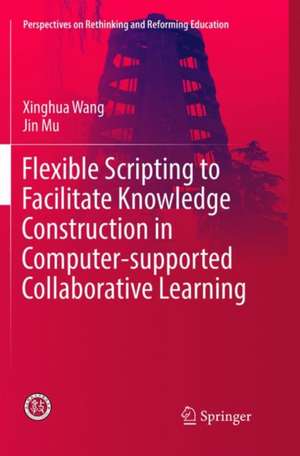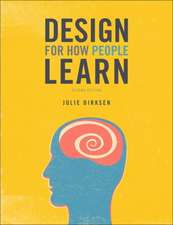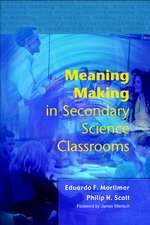Flexible Scripting to Facilitate Knowledge Construction in Computer-supported Collaborative Learning: Perspectives on Rethinking and Reforming Education
Autor Xinghua Wang, Jin Muen Limba Engleză Paperback – 11 dec 2018
In the first empirical study flexibility was accomplished through adaptivity, and through adaptability in the second. The results of these studies show that adaptive and adaptable scripts enhanced the quality of collaborative knowledge construction processes as well as learners’ collaboration skills, compared to inflexible scripts.
The findings presented in this book will contribute to theory building of the scripting approach in CSCL. The authors propose two innovative ways of achieving flexible scripting and address the mechanisms by which adaptive versus adaptable script influences collaborative knowledge construction. Moreover, the adaptive and adaptable scripting approaches provide hands-on examples for practitionersand contribute to their understanding of teaching design in CSCL settings.
| Toate formatele și edițiile | Preț | Express |
|---|---|---|
| Paperback (1) | 379.68 lei 6-8 săpt. | |
| Springer Nature Singapore – 11 dec 2018 | 379.68 lei 6-8 săpt. | |
| Hardback (1) | 386.81 lei 6-8 săpt. | |
| Springer Nature Singapore – 5 mai 2017 | 386.81 lei 6-8 săpt. |
Din seria Perspectives on Rethinking and Reforming Education
- 15%
 Preț: 586.38 lei
Preț: 586.38 lei - 18%
 Preț: 732.21 lei
Preț: 732.21 lei -
 Preț: 396.40 lei
Preț: 396.40 lei - 15%
 Preț: 700.29 lei
Preț: 700.29 lei - 18%
 Preț: 1009.54 lei
Preț: 1009.54 lei - 15%
 Preț: 701.72 lei
Preț: 701.72 lei -
 Preț: 388.13 lei
Preț: 388.13 lei - 18%
 Preț: 781.45 lei
Preț: 781.45 lei -
 Preț: 386.81 lei
Preț: 386.81 lei - 18%
 Preț: 943.07 lei
Preț: 943.07 lei -
 Preț: 451.48 lei
Preț: 451.48 lei -
 Preț: 383.12 lei
Preț: 383.12 lei - 18%
 Preț: 941.05 lei
Preț: 941.05 lei - 18%
 Preț: 953.03 lei
Preț: 953.03 lei - 15%
 Preț: 581.98 lei
Preț: 581.98 lei - 20%
 Preț: 564.52 lei
Preț: 564.52 lei - 18%
 Preț: 896.21 lei
Preț: 896.21 lei - 15%
 Preț: 638.24 lei
Preț: 638.24 lei - 15%
 Preț: 634.32 lei
Preț: 634.32 lei - 15%
 Preț: 632.70 lei
Preț: 632.70 lei -
 Preț: 382.36 lei
Preț: 382.36 lei - 18%
 Preț: 943.73 lei
Preț: 943.73 lei -
 Preț: 355.90 lei
Preț: 355.90 lei
Preț: 379.68 lei
Nou
Puncte Express: 570
Preț estimativ în valută:
72.67€ • 78.97$ • 61.09£
72.67€ • 78.97$ • 61.09£
Carte tipărită la comandă
Livrare economică 21 aprilie-05 mai
Preluare comenzi: 021 569.72.76
Specificații
ISBN-13: 9789811350269
ISBN-10: 9811350264
Ilustrații: VII, 137 p. 47 illus.
Dimensiuni: 155 x 235 mm
Greutate: 0.22 kg
Ediția:Softcover reprint of the original 1st ed. 2017
Editura: Springer Nature Singapore
Colecția Springer
Seria Perspectives on Rethinking and Reforming Education
Locul publicării:Singapore, Singapore
ISBN-10: 9811350264
Ilustrații: VII, 137 p. 47 illus.
Dimensiuni: 155 x 235 mm
Greutate: 0.22 kg
Ediția:Softcover reprint of the original 1st ed. 2017
Editura: Springer Nature Singapore
Colecția Springer
Seria Perspectives on Rethinking and Reforming Education
Locul publicării:Singapore, Singapore
Cuprins
Learning 2.0.- Introduction to Collaboration Scripts.- Flexible Scripting in CSCL.- An Empirical Study on Adaptive Scripting.- An Empirical Study on Adaptable Scripting.
Notă biografică
WANG Xinghua got her Ph.D degree in Educational Psychology at Ludwig Maximiliam University of Munich, Germany; and now is working as an assistant professor in the Faculty of Education at Beijing Normal University, China. Her research focuses on learning in different contexts, especially the authentic assessment of learning processes and outcomes in formal as well as informal setting.
MU Jin received her Ph.D in Educational Psychology at the University of Munich. Her main research area is Computer-Supported Collaborative Learning, specifically the assessment of the collaborative learning processes. She is particularly interested in emerging text classification and data mining technologies that provide novel approaches to analyze discourse data.
MU Jin received her Ph.D in Educational Psychology at the University of Munich. Her main research area is Computer-Supported Collaborative Learning, specifically the assessment of the collaborative learning processes. She is particularly interested in emerging text classification and data mining technologies that provide novel approaches to analyze discourse data.
Textul de pe ultima copertă
This book discusses the significance of flexible scripting to structure CSCL against the framework of “Script theory of guidance” and reports on findings from two empirical studies on the effects of flexible scripting on collaboration in CSCL scenarios.
In the first empirical study flexibility was accomplished through adaptivity, and through adaptability in the second. The results of these studies show that adaptive and adaptable scripts enhanced the quality of collaborative knowledge construction processes as well as learners’ collaboration skills, compared to inflexible scripts.
The findings presented in this book will contribute to theory building of the scripting approach in CSCL. The authors propose two innovative ways of achieving flexible scripting and address the mechanisms by which adaptive versus adaptable script influences collaborative knowledge construction. Moreover, the adaptive and adaptable scripting approaches provide hands-on examples for practitioners and contribute to their understanding of teaching design in CSCL settings.
In the first empirical study flexibility was accomplished through adaptivity, and through adaptability in the second. The results of these studies show that adaptive and adaptable scripts enhanced the quality of collaborative knowledge construction processes as well as learners’ collaboration skills, compared to inflexible scripts.
The findings presented in this book will contribute to theory building of the scripting approach in CSCL. The authors propose two innovative ways of achieving flexible scripting and address the mechanisms by which adaptive versus adaptable script influences collaborative knowledge construction. Moreover, the adaptive and adaptable scripting approaches provide hands-on examples for practitioners and contribute to their understanding of teaching design in CSCL settings.
Caracteristici
Proposes innovative ways of achieving flexible scripting in CSCL and demonstrates the significance of flexible scripting through systematic investigation Clarifies the differences between adaptive versus adaptable scripting and addresses their underlying mechanisms Equips readers to handle complex CSCL scenarios and to provide an optimal degree of structure for learners Includes supplementary material: sn.pub/extras








